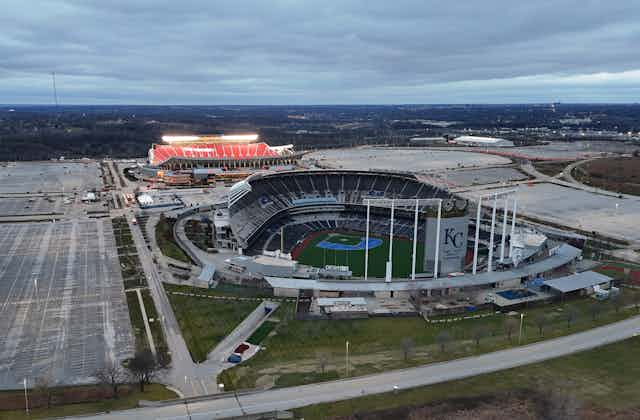For the Kansas City Chiefs brass, it must have seemed like the perfect time to ask local voters to cough up some money for stadium renovations.
The team was riding high from a big Super Bowl win in February 2024, its third NFL championship in the past five years. Two fellow NFL franchises, the Buffalo Bills and Tennessee Titans, had received record taxpayer handouts for new stadiums in the past two years. And voters in neighboring Oklahoma City had recently approved at least US$900 million in subsidies for a new NBA arena.
But the Chiefs and their partners in the effort, the Kansas City Royals of MLB, were in for a rude awakening.
On April 2, 2024, voters in Jackson County soundly rejected a referendum to extend a local sales tax for 40 years in order to provide $2 billion in public funding to build a new baseball stadium in downtown Kansas City and fund major renovations of Arrowhead Stadium, the home of the Chiefs.
The vote in Missouri came one month after the collapse of an arena project that would have moved the Washington, D.C.’s basketball and hockey teams, the Wizards and Capitals, to Alexandria, Virginia.
Similarly, proposed facilities in Las Vegas; Oakland, California; Tampa, Florida; and Chicago have all run into serious roadblocks, all stemming from taxpayers questioning why they should be forced to cover private businesses’ expenses.
What was looking like a flood of new taxpayer-financed sports facilities across the country has turned into a trickle.
A raw deal for the public
While leagues and team owners always claim that stadiums and arenas revitalize cities and generate huge economic returns, three decades of research by economists such as myself has proved otherwise.
A recent survey of over 130 academic studies shows that the direct economic benefits of stadiums fall well short of the enormous infusions of public money used to build them.
Even taking into account non-monetary benefits of sports teams, such as quality-of-life and civic pride, the survey concluded that “the large subsidies commonly devoted to constructing professional sports venues are not justified as worthwhile public investments.”
Giving voters a chance to weigh in
So the knowledge that stadiums are a terrible public investment is nothing new.
Why, then, were efforts to block a stadium successful in Kansas City, while residents of New York and Tennessee were saddled with billions in construction costs for new stadiums?
Most importantly, voters in Kansas City got a direct say in approving the project.
By contrast, Buffalo’s $850 million handout was negotiated in secret by the governor and dropped on unsuspecting taxpayers just days before a final vote was scheduled in the state Legislature.
Nashville’s $1.3 billion stadium subsidy was approved by the mayor and Metro Council, not by voters, who could only express their displeasure by throwing the offending government officials out of office during the next election, far too late to stop the project.
It turns out that handing over taxpayer dollars to billionaire owners tends to be far less popular among regular citizens than among well-connected government officials.

An NFL owner trying to curry favor with local government officials can always lay on the charm offensive by, say, inviting them into the owner’s box for games. That strategy doesn’t work when trying to win over an entire electorate.
Owners also tend to overestimate how many sports fans there really are in a community. Even in a relatively small market like Kansas City, fewer than 1 in 30 residents of the metro area are season ticket holders for the Chiefs. A significant majority of the population does not attend a single Royals game in a typical season.
An even smaller fraction of the population has access to VIP seating, yet both Kansas City ownership groups emphasized how the new stadiums would expand these amenities.
Luxury boxes are excellent ways to increase team profits. Public sentiment? Not so much.
Threats to relocate fall flat
Team owners routinely use the tactic of threatening relocation in order to extract subsidies from cities and states. But such threats have tended to produce more resentment than fear, making voter referendums less likely to pass.
In the case of Kansas City, the threat of relocation – halfheartedly hinted at by Chiefs president Mark Donovan – wasn’t taken seriously.
Kansas City is an excellent NFL market with a deeply committed fan base that any sensible owner would be reluctant to abandon. In addition, television revenues in the NFL are equally shared among all teams, meaning that even a relatively small-market team like the Chiefs can afford to pay top dollar to keep its best players, like quarterback Patrick Mahomes and tight end – and Taylor Swift beau – Travis Kelce.
The Royals, with fewer championships and star power, might be a more likely candidate for relocation. But such a move would require finding another city willing to do what voters in Missouri were unwilling to do: provide huge subsidies for a new baseball stadium.
Such cities have proved elusive. The Oakland A’s, unable to convince anyone in the Bay Area to build them a new baseball stadium, recently announced a move to Las Vegas, only to find out that Nevadans weren’t exactly keen to pay for it, either. The team may end up playing the next three years in a minor league stadium in Sacramento, California, while sorting out its next move.
Billionaire team owners have been trying to convince cities to redirect public money to their private companies for decades. But these subsidies primarily benefit the owners through higher revenues and franchise valuations, not the communities paying for the stadiums.
With Jackson County delivering a resounding loss to team owners, perhaps more Americans are finally heeding the words of former Minnesota governor Jesse “The Body” Ventura.
“Stadiums should be like libraries,” he said during a 2001 House Judiciary Committee hearing. “If the taxpayers build it, they should be able to use it for free.”

